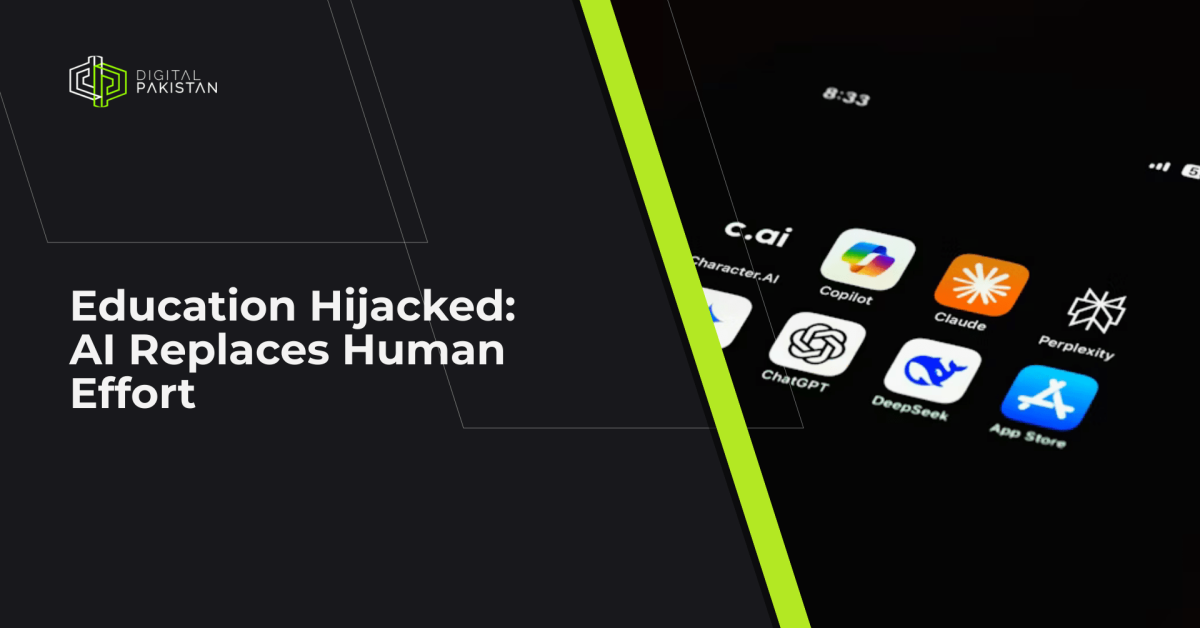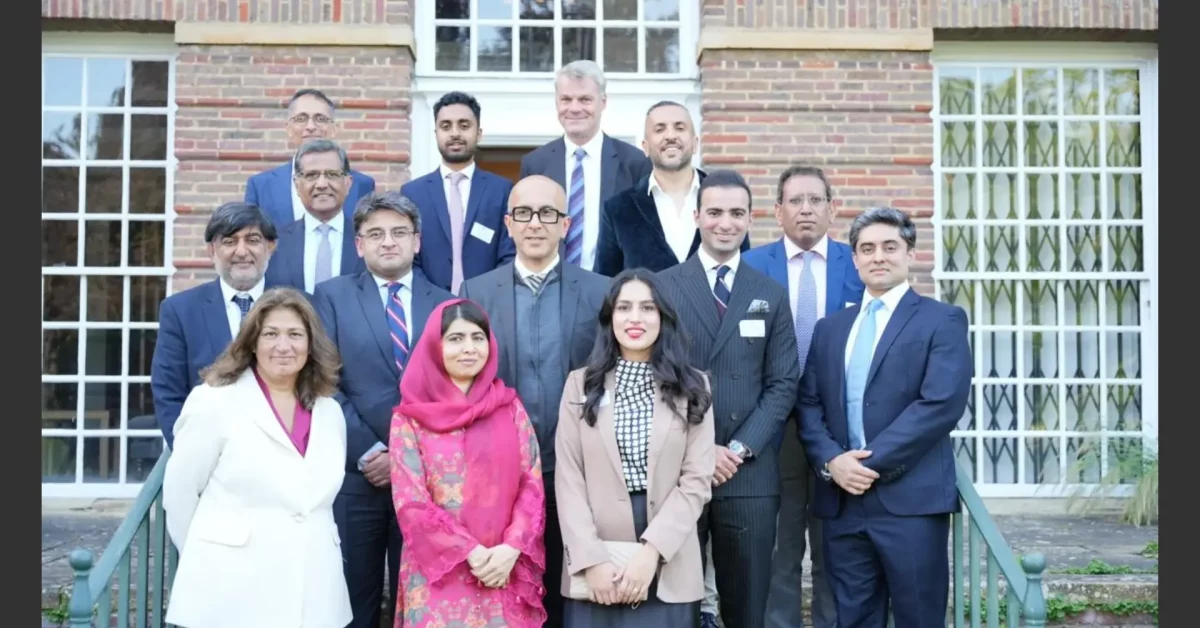
Raast QR Subsidy Powers Cashless Pakistan Drive
September 26, 2025
PM Shehbaz Meets Trump: Discusses Security and Cooperation
September 27, 2025Introduction: The paradigm shift from human-centered learning to generative AI
Welcome to the age of artificial intelligence, where taking the path of least resistance means outsourcing virtually every task to a program that does the heavy lifting for us. Where the oversimplification of complicated information concurrently encourages shallowness of intellect and banality in the current generation of students.
There is no doubt that AI has enhanced key aspects of our work and academic lives. It intensifies our work ethic by making us more efficient than ever before and better at compartmentalizing. With these assistive tools we’re able to adapt quicky to the rapidly changing demands of this new age.
As generative AI evolves with each passing day, it has become an arrow aimed straight for the heart of academic institutions. The argument that AI tools are employed for the sole purpose removing obstacles in human-centered learning, collapses in on itself when what masquerades as an assist, begins to cause a complete erasure of true academic learning.
The days of conducting solid research, going over multi-disciplinary texts and conceptualizing authentic viewpoints to produce an original piece of academic writing are long gone. It isn’t empowerment, it is ineptitude.
By allowing AI to assume full charge of one’s literacy tasks marks the demise of the entire process behind creating a well-rounded and well-educated individual. This paradigm shift is not as black and white as it may seem. Pointing fingers at AI is of no avail when it’s possible that the fault lies in our presenting attitudes towards education.
The Demise of Process
The process of active learning is the centerpiece around which the structure of academia is constructed. Education is not mainly a matter of revisions, examinations and grades. It is, in essence, a journey that is only limited in its scope and rewards by what we decide for ourselves.
This slow and steady process constitutes diligently investing one’s own capabilities and talents into achieving desired results. Thus, strengthening and diversifying the learner’s faculties for appraising complex information, planning, analyzing, organizing and problem-solving. Even the most trivial steps during this time are instrumental in establishing a firm academic footing.
Learning is not confined to the walls of a classroom and it is not a one-size-fits-all indoctrination of facts and figures concerning the state of our earthly affairs. It is a very personal endeavor, teeming with moments of self-discovery, enlightenments and renewals, channeling psychological and physical growth.
The quality of learning, wherever it may be taking place, depends heavily on the individual’s willingness and curiosity, as well as their goals and inspirations. It is also contingent on the instructor’s methods, motives and sense of responsibility that are highly consequential for the student.
With the advent of AI, we’re noticing an obliteration of the process itself. AI as a cheat mode for carrying out academic duties, such as writing, reading and researching – that are meant to be accomplished via human efforts and dexterities – poses a grievous peril to student’s integrity, progress and discipline, and the fundamental purpose of education.
The Misuse of Power
Possessing power is not the source of all evil. The way the hands that brandish the power execute it, is what ultimately determines whether it was good or bad. The case of generative AI and our academic plight is not unlike this maxim. AI is essentially sold to us as quite a valuable tool, designed to better our standards of living. Until we turn it into a self-destruct button.
When students reallocate their scholarly activities to an automated intelligence which churns out an inauthentic, uninspired, non-human version of the assignment, it takes learning out of the equation altogether. In other words, the student is no longer an independently functioning participant in the trajectory of their education, and, by extension, their personal development.
In many countries, tensions are already rising among teachers in schools settings and higher education organizations. The landscape of academia is quicky morphing; Next gen students do not value reading itself, let alone presenting original essays, or engaging in reflective judgment, thoughtful critique and strategic problem solving that isn’t directly copy-pasted from AI.
It’s one thing to seek help from AI for the purposes of understanding how a student can polish up their work and improve themselves. It is a very deleteriously different thing when they relinquish control entirely before a machine, triggering the erosion of crucial skills and knowledge. Forming a breeding ground for incompetence and cognitive impoverishment.
Are Teachers Obsolete?
A teacher’s head hangs heavy with the weight of the crown of an insurmountable position. Chatbots can’t reproduce the same impact as human-centered learning, which thrives on the interactive bond between students and teachers. This bond is imperative for fostering emotional intelligence, socialization skills, collaboration and worthwhile mentorship.
In the recent years, AI has infiltrated the vital connection between students and their instructors. Thus, impeding the age-old mentor-mentee relationship. The increasing distance that separates the two is culpable for inducing major gaps in students’ intellectual prowess. AI has made several jobs appear obsolete and teaching might just be one of the many.
Ungoverned access to personalized algorithmic learning, which provides instant feedback and fast information, is limiting the need for student-teacher interactions. Many institutions recognize automated deliverance of education as cost-effective and wide reaching, therefore phasing out the requirement for human involvement.
AI based teaching is eradicating linguistic and educational diversity, while diminishing student skill sets. Chatbots, immersive learning software and virtual instructors are dethroning conventional teachers, devaluing the vocation and desensitizing students to the requirement for human connection. You can’t value what you don’t miss, and vice versa.
Conclusion
The indefinite proliferation of generative AI in student lives around the world, is manifesting through rising rates of illiteracy, privation of critical thinking and nuance, and an overall crisis of true scholarship. Evaluating student assignments now comes with the added exercise of running each work through AI detection tools to check for their degree of originality.
Abundant reliance on AI signals the imminent decline of students’ competencies within the parameters of critical evaluation, eloquent communication, acquisition of multidimensional insights and well-versed knowledge, to name a few. By doing so, students expunge traces of their own identities since there isn’t an adequate human element contributing to the work.
At the end of the day, this shift in approach towards academia offers few long-term advantages to students and teachers. Rather than bridging the shortcomings of education systems, the tides seem to have turned in the opposite direction, restricting students from reaching their full potentials and exploring the expanse of what they can personally achieve.






